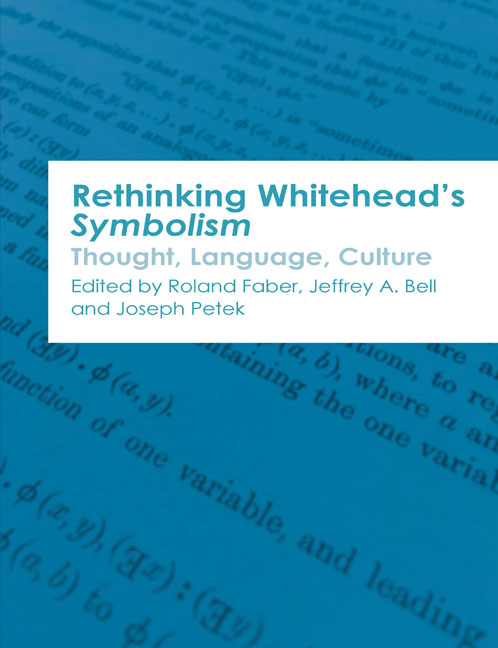Book contents
- Frontmatter
- Contents
- Abbreviations
- Introduction
- Part I Perception and Paradox
- 1 Whitehead on Causality and Perception
- 2 Originary Symbolism: Whitehead, Deleuze and the Process View on Perception
- 3 Uniting Earth to the Blue of Heaven Above: Strange Attractors in Whitehead's Symbolism
- Part II Adventures in Culture and Value
- Part III Misplaced Concreteness in Ethics and Science
- Notes on Contributors
- Index
1 - Whitehead on Causality and Perception
from Part I - Perception and Paradox
Published online by Cambridge University Press: 23 June 2018
- Frontmatter
- Contents
- Abbreviations
- Introduction
- Part I Perception and Paradox
- 1 Whitehead on Causality and Perception
- 2 Originary Symbolism: Whitehead, Deleuze and the Process View on Perception
- 3 Uniting Earth to the Blue of Heaven Above: Strange Attractors in Whitehead's Symbolism
- Part II Adventures in Culture and Value
- Part III Misplaced Concreteness in Ethics and Science
- Notes on Contributors
- Index
Summary
Whitehead discusses symbolism – among other reasons – in order to get a handle on the problem of error. This, of course, is something that has preoccupied Western philosophy for a long time. Descartes' Meditations on First Philosophy begins with his worries about ‘how numerous were the false opinions that in my youth I had taken to be true, and how doubtful were all those that I had subsequently built upon them’. Whitehead's erstwhile collaborator Bertrand Russell similarly opens his volume The Problems of Philosophy with the question: ‘Is there any knowledge in the world which is so certain that no reasonable man could doubt it?’ Modern Western philosophy – from Descartes through to Kant and on to today – generally privileges epistemology over ontology. We cannot claim to know the way things are without first giving an account of how it is that we know. We cannot consider the consequences of a proposition until we have first assured ourselves that it is free from error.
Whitehead gives his own deceptively bland statement of the problem of truth and error towards the beginning of Symbolism: ‘An adequate account of human mentality requires an explanation of (i) how we can know truly, (ii) how we can err, and (iii) how we can critically distinguish truth from error’ (S 7). Despite this unexceptionable goal, however, Whitehead does not seem to think that the problem of error is of great importance. Indeed, he takes what most philosophers would consider a cavalier, indeed irresponsible, attitude towards the whole question. For he holds that ‘in the real world it is more important that a proposition be interesting than that it be true’ (PR 259). A scientific observation, a common-sense hypothesis, or even a rigorous philosophical formulation may have relevant and important consequences despite the fact that it is erroneous. For this reason, Whitehead is less concerned with eliminating error than with experimenting with it, and seeing what might arise from it. Error is not an evil to be exterminated, but a frequently useful ‘lure for feeling’ (PR 25 and passim). It is a productive detour in the pathways of mental life: ‘We must not, however, judge too severely of error. In the initial stages of mental progress, error in symbolic reference is the discipline which promotes imaginative freedom’ (S 19).
- Type
- Chapter
- Information
- Rethinking Whitehead’s SymbolismThought, Language, Culture, pp. 13 - 28Publisher: Edinburgh University PressPrint publication year: 2017

